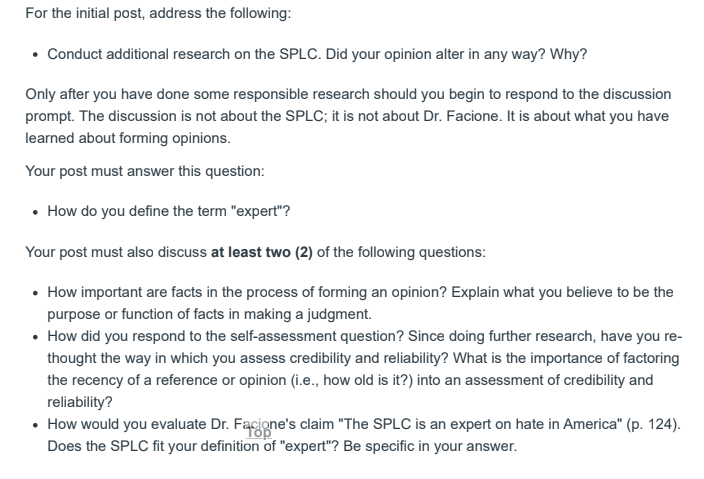
Introduction
“Everyone is entitled to their own opinions – but not their own facts.” (Daniel Patrick Moynihan, cited in Vanity Fair, 2010, para. 2)
We form opinions – and make our judgments – based on facts we observe and values we hold. Our judgments are also influenced by the opinions of others. In the section “An Expert on Hate in America” in Chapter 6, one of the authors, Dr. Peter Facione, renders an opinion on a non-profit civil rights organization: Southern Poverty Law Center (SPLC). Dr. Facione is a leading advocate and one of the most influential voices in the field of critical thinking.
His endorsement of the civil rights organization is unqualified. It is also transparent: Dr. Facione reveals that he is a financial supporter of the organization and has arranged speaking engagements for its founder. This is Dr. Facione’s invitation to you, the reader:
Knowing where you can learn more about the SPLC for yourself, and knowing about Dr. Facione’s endorsement and support of the Center’s work, evaluate this claim made by Dr. Facione: “The SPLC is an expert on hate in America” (p. 124).
The endorsement of the SPLC is contained in the most current edition of the text, whose copyright date is 2016. Since that time Morris Dees, co-founder and former chief trial counsel, has been fired (Hassan, Zraick & Blinder, 2019). Previously, there has been controversy about groups and individuals that are listed by the SPLC as “hate groups” (Graham, 2016; Price, 2018). The organization, which has nearly a half-billion dollars in assets, has also been criticized for how it spends these funds (Robinson, 2019).
Self-Assessment Question
Before you submit your initial post, make sure to read the assigned chapter. Then, ask yourself the following: Did the article in Chapter 6 of the text seem credible and reliable? Why? Be very specific:
- Was it because it is in a textbook?
- Because it was written by a learned and respected person?
- Because of content in the article?
- Because of your previous knowledge of the SPLC?
Initial Post Instructions
For the initial post, address the following:
- Conduct additional research on the SPLC. Did your opinion alter in any way? Why?
Only after you have done some responsible research should you begin to respond to the discussion prompt. The discussion is not about the SPLC; it is not about Dr. Facione. It is about what you have learned about forming opinions.
Your post must answer this question:
- How do you define the term “expert”?
Your post must also discuss at least two (2) of the following questions:
- How important are facts in the process of forming an opinion? Explain what you believe to be the purpose or function of facts in making a judgment.
- How did you respond to the self-assessment question? Since doing further research, have you re-thought the way in which you assess credibility and reliability? What is the importance of factoring the recency of a reference or opinion (i.e., how old is it?) into an assessment of credibility and reliability?
- How would you evaluate Dr. Facione’s claim “The SPLC is an expert on hate in America” (p. 124). Does the SPLC fit your definition of “expert”? Be specific in your answer.
ANSWER:
The self-assessment question asked about my thoughts on the credibility and reliability of the 6th chapter. I did not find it to be credible or reliable; the reason being that I had prior knowledge about the scandals and accusations involving the Southern Poverty Law Center. I had already encountered several articles exposing the organization’s shortcomings. After doing further research, I found my method of gauging the validity and credibility of a source to be valid. Usually, I assess factors such as currency of the content, authority of the author or speaker, factual support, and also consider the influence of the author’s or speaker’s bias. In this case, for instance, it was evident that Dr. Facione would be biased in favor of the organization, given that he was one of its financial supporters CONTINUE READING…
